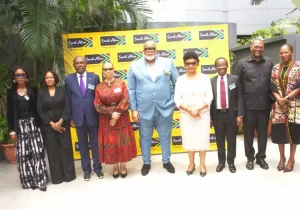The Commissioner for Commerce, Co-operative, Trade and Investment, Lagos State, Folashade Ambrose-Medeme, has reaffirmed that Lagos State contributes over 30 per cent to Nigeria’s Gross Domestic Product (GDP).
Speaking in Lagos during the visit of a South African business delegation organised by WESGRO Cape Town and Western Cape tourism, trade & investment, Ambrose-Medeme described Lagos as far more than just a state: “It is a dynamic megacity and a living market ecosystem, accounting for over 60 per cent of Nigeria’s non-oil manufacturing.
Lagos remains a crucible for innovation, resilience, and inclusive prosperity,” she noted.
She commended the Consul-General of South Africa in Nigeria for convening what she called not just a ceremonial exchange but “a strategic gathering of visionaries from two of Africa’s most formidable economies—Nigeria and South Africa.”
Highlighting the importance of the engagement within the context of the Lagos State Development Plan (LSDP 2052), she said the long-term blueprint unlocks significant opportunities for bilateral trade and investment as Lagos advances its economic vision.
“Today, we represent over 300 million people, holding the keys to Africa’s socio-economic transformation. I warmly welcome the South African delegation and all distinguished guests to Lagos—the commercial, financial, and innovation hub of Nigeria and the West African sub-region,” she said.
The LSDP 2052, she explained, is built on four pillars: a thriving economy, human-centric development, modern infrastructure, and effective governance—all designed to drive inclusive and resilient growth.
According to Ambrose-Medeme, Lagos offers unique prospects across sectors such as tourism and the creative economy. Noting Lagos’s global reputation in music, film, fashion, and cultural expression, she pointed to transformative projects like the Lagos Film City and Lagos Cruise Terminal as prime opportunities for South African co-investment.
“From Afrobeat to Nollywood, from art festivals to beach tourism, Lagos pairs creative talent with supportive infrastructure and policy frameworks to unlock scalable returns,” she said.
She identified clear opportunities for South African firms in destination branding, leisure investments, event production, and film co-financing, which would deepen intra-African cultural exchange and generate revenue.
Beyond creative industries, Ambrose-Medeme underscored the importance of strengthening bilateral trade. She revealed that Lagos is training about 250 MSMEs through its Export Readiness Programme to help them meet export standards and expand into new markets.
To improve the business climate, she noted that Lagos State has set up a one-stop shop for business registration and investor services, digitised business premises registration, and reformed land titling via the Enterprise GIS system.
“Our commerce database helps us tailor support to MSMEs, ensuring inclusivity. We also have a strong cooperative network to empower businesses,” she added.
She urged Lagos and South Africa to expand their partnership beyond traditional commodities to include services, healthcare, technology, education, and knowledge transfer. With the African Continental Free Trade Agreement (AfCFTA) breaking down barriers and aligning standards, she said it is the right moment to build regional value chains that help SMEs compete continent-wide.
“I challenge us to consider triangular investment models—where Nigerian and South African businesses co-invest locally and jointly enter markets in Francophone West Africa, East Africa, Europe, and the Middle East,” she proposed, highlighting opportunities in renewable energy, logistics, pharmaceuticals, design, and infrastructure.
Ambrose-Medeme also announced that the state is preparing the Lagos State Industrial Plan 2025–2030, which will create investable projects, blended finance instruments, and cross-border partnerships to make Lagos Africa’s most investor-friendly metropolis.
“Our government is transparent and committed to enabling businesses and regional prosperity,” she affirmed.
The Commissioner reiterated Lagos’s openness to forward-thinking, cross-continental collaborations:
“Let today’s conversations turn into tomorrow’s investments. Let our shared pan-Africanism move from political solidarity to real economic prosperity. To our South African colleagues, Lagos welcomes you. To Nigerian entrepreneurs, Lagos challenges you to scale across the continent. And to all of us—let’s build together, trade together, and grow together,” Ambrose-Medeme concluded.


